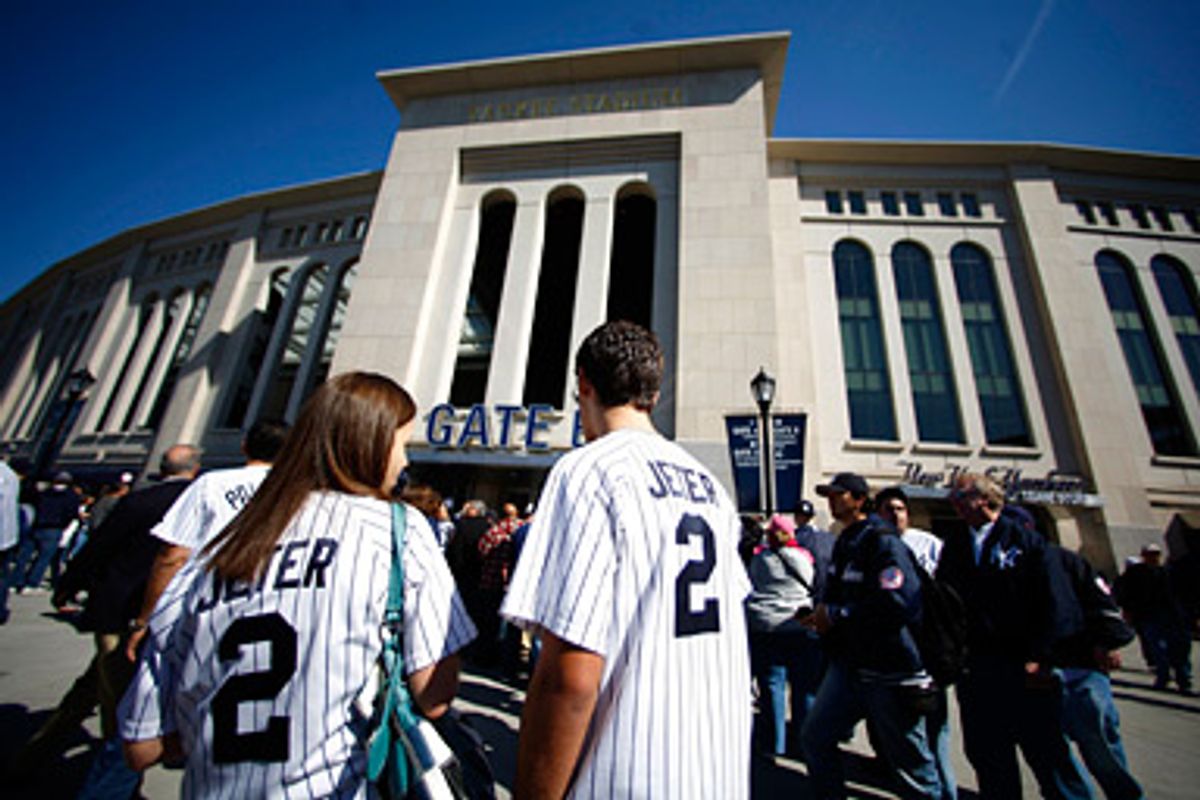Somewhere, likely in a basement, the next great documentarian is scavenging YouTube for clips of congressional inquisitions, Wall Street perp walks, and CNBC rants for a future Oscar-winning film about the times we're living through. I'm hoping this future star calls her film "Wall Street II: Cataclysmic Boogaloo," and more important, I'm hoping she gets footage of New York Mayor Michael Bloomberg, preferably wearing a top hat and monocle.
Even amid CEO testimony, Bernie Madoff grimaces and Rick Santelli diatribes, nothing better captures the moment's destructive greed than a billionaire politician using the municipal office he bought to defend charging $2,500 a ticket to a new Yankee Stadium he forced the public to finance. If there is a single act showing how kleptocracy and let-them-eat-cake-ism are systemic and local rather than momentary and exclusively federal, Bloomberg turning the House that Ruth Built into the House That Taxpayers Built is it.
Foreign oligarchs use guns to confiscate citizens' wages. American oligarchs rely on government to give theft the aura of legitimacy, and Manhattan's richest man is no exception. As an investigation by Democratic Assemblyman Richard Brodsky documents, Bloomberg used various public agencies to extract between $1 billion and $4 billion from taxpayers and then spent the cash on a new stadium for the Yankees, the wealthiest corporation in sports.
The move followed a Bloomberg-backed 2005 initiative giving infamous investment bank Goldman Sachs $1.6 billion in taxpayer-financed bonds to construct its new headquarters -- and amazingly, this encore rip-off is more spectacular. Mimicking tax cheats' deliberately complex transactions, the city owns the stadium, leases it to an agency, which then leases it to a corporate subsidiary, which then leases it to the Yankees. At the end of the Ponzi scheme, the team is permitted to use the taxes it already owes to pay off the mortgage on its new chateau.
New Yorkers might be celebrating if these giveaways delivered verifiable returns to taxpayers. But Brodsky’s report notes that "there is little in new job creation, private investment, or new economic activity" from the expenditure. Taxpayers don't even get affordable seats. According to Newsday, they get a stadium charging the highest ticket prices in baseball -- $2,500 for "premium" views (since reduced to "just" $1,250) and $410 for a family of four in the cheap seats.
Like Wall Street firms insisting that trillion-dollar bailouts are a small price for economic stability, Bloomberg justified everything first by saying taxpayers "put next to nothing" into the stadium. (In fairness, a media-mogul mayor who is the planet's 17th wealthiest man may genuinely believe a few billion is "next to nothing" -- but, for comparison, it's more than all the devastating cuts to police, firefighting, school and infrastructure budgets that he proposed in his budget.)
Then Bloomberg offered the same laissez-faire paean that financial CEOs cite in opposing executive pay caps. "Don't ever think sports is anything but a business," he said, joining bankers in selectively forgetting that arguments for free-market "business" ring hollow when government is propping up said "business."
If this tale of the House that Taxpayers Built was some anomaly, it might be vaguely funny. But while Bloomberg sets milestones for avarice, the bailout-ism he espouses is the norm.
In Washington, "The Obama administration has broken all records in the distribution of taxpayer dollars to American businesses, primarily banks, automobile manufacturers and insurance companies," reports the Huffington Post. At the local level, lawmakers trip over themselves to throw giveaways at corporate campaign donors.
In the new Gilded Age, socializing risk and privatizing profit has become the standard -- as American as General Motors, Bank of America and, yes, the New York Yankees.



Shares